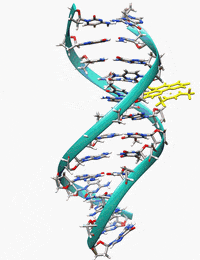Apolipoproteins (APO) are structural constituents of lipoprotein particles that play critical roles in blood lipid metabolism and transport. Apolipoprotein E (APOE) is a major constituent of triglyceride-rich chylomicrons, very low-density lipoproteins (VLDL) and some subclasses of high-density lipoprotein (HDL). Defects in APOE can result in dyslipidemia, which is an important risk factor in the genesis of atherosclerosis and subsequent development of cardiovascular disease. The APOE assay tests for APOE mutations that predict risks for cardiovascular disease.
Clotting Factor II, or prothrombin, is a Vitamin K-dependent pro-enzyme that functions in the blood coagulation cascade. It is a precursor to thrombin, which in turn strengthens a protective clot. The prothrombin 20210G>A mutation in the Factor II gene, results in increased levels of plasma prothrombin and a concurrent increased risk for thrombosis. Prothrombin-related thrombophilia is characterized by venous thromboembolism (VTE). The Factor II assay tests for the presence of mutations associated with increased risk for thrombosis.
The Factor V Leiden gene encodes the coagulation factor V. In normal conditions, Factor V is inactivated during the clotting process by the activated protein (APC). In subjects with factor V Leiden thrombophilia, a mutation produces a Factor V that cannot be inactivated normally by APC and as a result, the clotting process remains active longer than usual leading to more thrombin generation. In the US, the frequency of the factor V Leiden mutation varies by ethnicity with about 5% of Caucasians, 2% of Hispanics, 1% of African Americans. The Factor V Leiden assay tests for the presence of the mutation in the Factor Leiden gene associated with increased risk for thromboembolism
Methylenetetrahydrofolate reductase (MTHFR) is involved folate metabolism and is essential for the remethylation of homocysteine. Two mutations in the MTHFR gene result in decreased enzyme activity, which is linked to increased plasma homocysteine levels. Mild to moderate hyperhomocysteinemia has been identified as a risk factor for venous thromboembolism and other cardiovascular diseases such as coronary heart disease and stroke. The MTHFR assay tests for mutations in MTHFR gene associated with decreased enzymatic activity of MTHFR.
The SLCO1B1 gene encodes a liver-specific transporter involved in the removal of endogenous compounds such as bile acids and bilirubin as well as drugs such as statins from the blood to the liver. Some variants of the SLCO1B1 gene result in a low functioning protein, which impairs statin clearance and may lead to increased risk for muscle pain, tenderness or weakness, associated with myopathy. The SLCO1B1 assay tests for the presence of SLCO1B1 variants associated with low functioning protein.
Vitamin K Epoxide Reductase Complex, subunit 1 (VKORC1) is the target of anticoagulants. Mutations in the VKORC1 gene results in altered sensitivities towards anticoagulants. VKORC1 genotype defines three levels of clinical phenotypes, high sensitivity, moderate sensitivity, and low sensitivity phenotypes towards warfarin, a widely used anticoagulants
The CYP2C9 is involved in the metabolism of 15% of clinically important medications. Examples of such medications used in pain management include Ibuprofen, Aleve, Voltaren, Feldene, Celebrex, Aspirin and Mobic. To date 30 different variants of CYP2C9 have been identified. The CYP2C9 assay identifies some common variants associated with variability in CYP2C9 enzyme activity.
The CYP2C19 is involved in the metabolism of approximately 10% of clinically relevant medications including some that are prescribed for pain management such as Valium and Soma. To date 30 different variants of CYP2C19 have been identified. The CYP2C9 assay identifies some common variants associated with variability in CYP2C9 enzyme activity in turn patient response to treatment.
The CYP2D6 is involved in the metabolism of 25% of clinically important medications including the following analgesics: Codeine, Tramadol and Vicodin. To date more than a 100 different variants in CYP2D6 have been identified. The CYP2D6 assay identifies common variants associated with variability in CYP2D6 enzyme activity and in turn patients response to treatment.
CYP3A4 and 3A5 are involved in the metabolism of approximately 50% of commonly used drugs including drugs used for pain management such as methadone. CYP 3A4 and CYP3A5 enzymes have overlapping substrate specificity and the contribution of CYP3A5 in the overall metabolism is smaller than the one for CYP3A4. The overall CYP3A metabolism status is expected to affect drugs that have narrow therapeutic index. The CYP3A assay tests for the presence of CYP3A genetic variants that can influence its activity.
